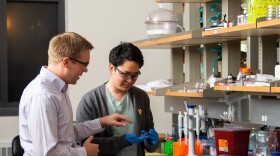-
Bladder cancer affects thousands of people in the U.S. each year – and it’s difficult to treat. But scientists at CU Boulder may have found an innovative way to deliver chemotherapy to patients with bladder cancer. It’s inspired by the gripping power of gecko feet. We explore how the tiny lizards may have inspired a better form of cancer treatment.
-
Some Denver parents got texts during this winter's brutal flu season with videos sharing why people in their neighborhoods chose flu shots for their kids. It was an unusual study about trust and vaccines in a historically Black community but no one will know how it worked out: The Trump administration canceled the project before the data could be analyzed.
-
With the Trump administration making sweeping cuts to staff and research grants at science-related agencies, artificial intelligence could offer a tempting way to keep labs going, but scientists say there are limits to the technology’s uses.
-
Strong friendships are an important part of our well-being. If you want to cultivate new friendships – or learn to nurture the relationships you have – we get practical advice from CSU’s resident expert on friendships, today on In The NoCo.
-
A CU researcher made an interesting discovery recently. He found that injecting mice with a strain of helpful bacteria prevented weight gain – even in mice that were fed the equivalent of an all-fast food diet. He joined In The NoCo to talk about why this could be a promising solution for obesity in humans.
-
Studies show that women are more likely than men to have trouble sleeping. A new study from the University of Colorado examined why – and found some surprising answers. Are your sleepless nights caused by biology, or shaky scientific research? We dig into that question today on In The NoCo.
-
In the NoCo spoke with an assistant professor focused on relationships and friendships. She shares her tips on how to strengthen your bonds with friends in the new year.
-
Strong friendships are an important part of our wellbeing. So if one of your New Year’s resolutions is to foster better relationships, today’s In The NoCo can help you make a plan. We get advice from CSU’s resident expert on friendship and relationships.
-
A team of researchers at CU’s Anschutz Medical Campus is leading an ambitious project that may eventually allow doctors to restore a patient’s sight – by performing an eye transplant. The procedure is just a goal for now. Today on ITN, the lead researcher explains how she hopes to make it reality.
-
When toxic gasses leak into the atmosphere, they are impossible to see. But scientists at CU Boulder are designing a technology to detect chemical threats.

Play Live Radio
Next Up:
0:00
0:00
Available On Air Stations









